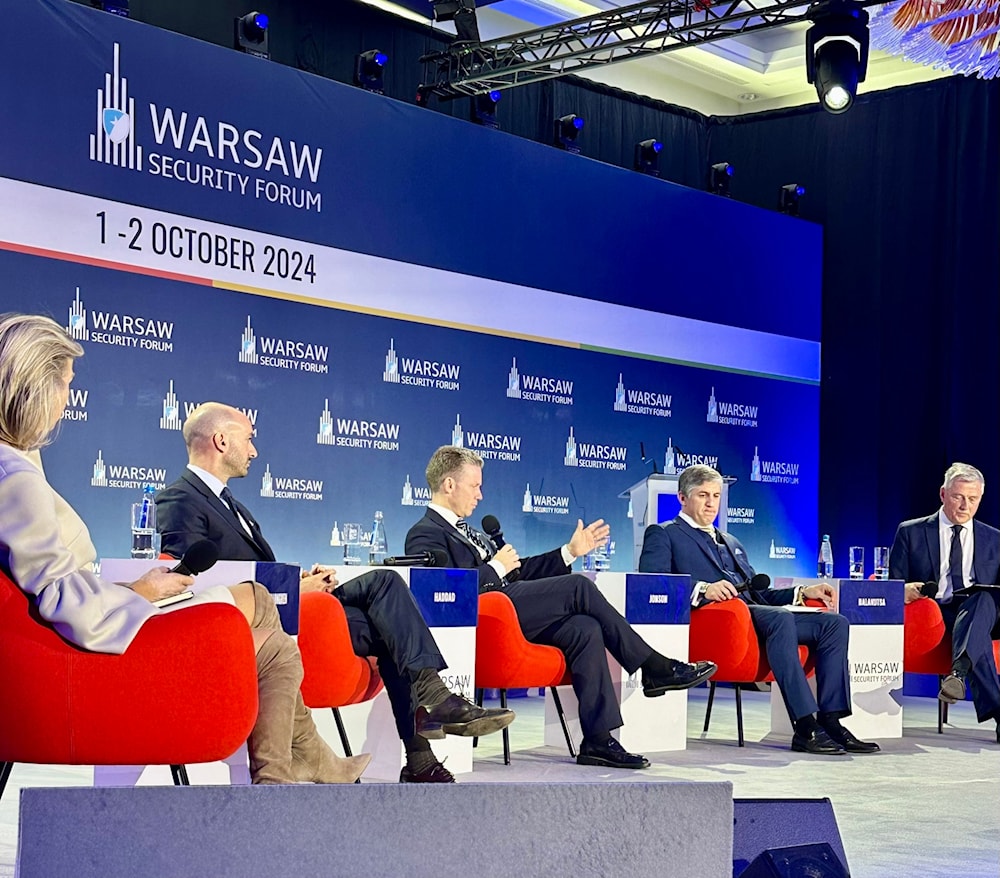Ukrainian defense official calls Western allies 'infantile'
For months, Ukrainian President Volodymyr Zelensky has sought approval to use US-made ATACMS, British Storm Shadow, and French SCALP missiles to strike within Russia's internationally recognized borders.
-

Participatants in a panel on Support to Ukraine’s Victory beyond Arms Deliveries with Oleksandr Balanutsa, Benjamin Haddad and Kajsa Ollongren. (social media)
Ukrainian Deputy Minister of Defense for European Integration, Aleksandr Balanutsa, has voiced frustration with Ukraine's Western backers for their reluctance to allow the use of advanced Western-supplied missiles in strikes against targets deep inside Russian territory.
Speaking at the Warsaw Security Forum, Balanutsa called out what he described as an "infantile" approach by some NATO member states, warning that unless Ukraine is fully equipped to repel Russian forces, Moscow will eventually turn its sights on NATO’s eastern flank, including the Baltic states, Poland, and Moldova.
For months, Ukrainian President Volodymyr Zelensky has sought approval to use US-made ATACMS, British Storm Shadow, and French SCALP missiles to strike within Russia's internationally recognized borders.
While London and Paris have indicated a willingness to proceed, they are waiting for Washington to give the green light.
The Biden administration remains cautious, fearing that such an escalation could widen the conflict.
Read more: US to announce $375Mln 'arms package to Ukraine including cluster ammo
'We are not infants in Ukraine'
Russian President Vladimir Putin has already warned that enabling Ukraine to launch long-range strikes into Russian territory would effectively draw Western nations directly into the war, as the Ukrainian military is not capable of operating such sophisticated weaponry without external support.
During his remarks, Balanutsa challenged Western indecision, stating, "We are not infants in Ukraine, and I’m asking my partners also to wake up and grow up a little bit."
He added that if Ukraine were given the necessary weapons, it could "do the job" and ensure the safety of NATO member states, while also asserting that Ukraine's military now surpasses NATO standards.
Balanutsa's comments follow reports that the White House has not yet agreed to Ukraine's request for long-range missile capabilities, despite Zelensky's recent diplomatic efforts.
In contrast, Russia has proposed updating its nuclear doctrine to classify any non-nuclear state that acts with the support of a nuclear power as committing a "joint attack," which could trigger a nuclear response.
Putin revamps Russia's nuclear rules
During a televised meeting of Russia's Security Council on nuclear deterrence on September 26, Putin revealed forthcoming revisions to Russia's nuclear doctrine, which notably lowers the threshold for the use of nuclear weapons.
He warned that Russia may now consider using nuclear weapons in response to a conventional arms attack, in line with the new updates to the doctrine, formally known as the Basic Principles of State Policy on Nuclear Deterrence.
Putin explained that an attack on Russia by a non-nuclear nation with the "participation or support of a nuclear power" would be treated as a "joint attack on the Russian Federation."
Additionally, he noted that Russia could deploy nuclear weapons in response to any conventional attack considered a "critical threat to our sovereignty."
Although Putin did not directly reference Ukraine, he mentionned that the updates to Russia's nuclear doctrine were necessary due to a rapidly changing global landscape that has introduced new threats and risks to the country.
Read more: Putin signs decree for Autumn conscription, summoning 133,000 citizens

 3 Min Read
3 Min Read









